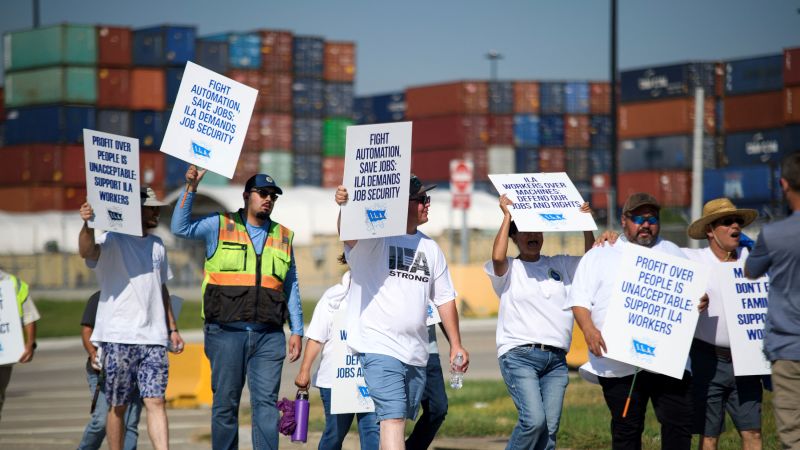Striking members of the International Longshoremen’s Association will be back to work at the ports on Friday, the union announced Thursday evening, as the union and the management group representing shipping lines, terminal operators and port authorities have reached a tentative deal on wages.
The union agreed to extend the contract it had with the United States Maritime Alliance, the management group known as USMX that represents shipping lines, terminal operators and port authorities. That deal, which had expired at the end of Monday, will be now extended until January 15 and have the union members back on the job while the final details are worked out in a full agreement and it is ratified by the rank-and-file.
The 50,000 members of the union working at ports from Maine to Texas have been on strike since early Tuesday morning, halting the flow of the majority of containerized imports into the United States, along with many of the exports, disrupting the sales of American businesses overseas.
A tentative deal would still need to be ratified by the rank-and-file ILA members before it would take effect. But with ships stuck at sea unable to come into US ports to unload and load goods, the union has agreed to have workers return to work on Friday.
Still, should the members vote against the deal, the strike might start once again. And such a rejection of a tentative labor deal is not unheard of.
Just last month, the International Association of Machinists (IAM) and jet maker Boeing reached a tentative deal that union leaders recommended their 33,000 members accept and even described as the best deal they had ever negotiated with the company. But union members voted nearly unanimously to reject it and have remained on strike since September 13.
The port strike was still in its early days, but it would have had broad ramifications for the US economy the longer it continued.
Business groups have been calling on the Biden administration to order strikers back to work. The work stoppage threatened the supply of everything from bananas to liquor to European luxury cars, all with the busy holiday shopping season less than two months away. And those shortages could have resulted in upward pressure on prices.
But President Joe Biden had refused to use powers he has under the Taft-Hartley Act to block or end the strike, saying he would not interfere with the collective bargaining process. Biden, Vice President Kamala Harris and Secretary of Transportation Pete Buttigieg had all called on the USMX to negotiate a deal with the ILA that fairly shared the record profits with members.
This is a developing story and will be updated.
Read the full article here




